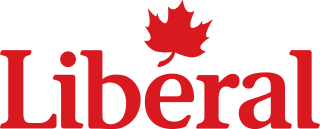
The Liberal Party of Canada is the oldest and longest-serving governing political party in Canada. The Liberals form the current government, elected in 2015. The party has dominated federal politics for much of Canada's history, holding power for almost 69 years in the 20th century—more than any other party in a developed country—and as a result, it is sometimes referred to as Canada's "natural governing party".
A royalist supports a particular monarch as head of state for a particular kingdom, or of a particular dynastic claim. In the abstract, this position is royalism. It is distinct from monarchism, which advocates a monarchical system of government, but not necessarily a particular monarch. Most often, the term royalist is applied to a supporter of a current regime or one that has been recently overthrown to form a republic.

Political colours are colours used to represent a political party, either officially or unofficially. Parties in different countries with similar ideologies sometimes use similar colours. For example, the colour red symbolises left-wing ideologies in many countries while the colour orange symbolizes Christian democratic political ideology. However, the political associations of a given colour vary from country to country: red is also the colour associated with the conservative Republican Party in the United States. Politicians making public appearances will often identify themselves by wearing rosettes, flowers or ties in the colour of their political party.
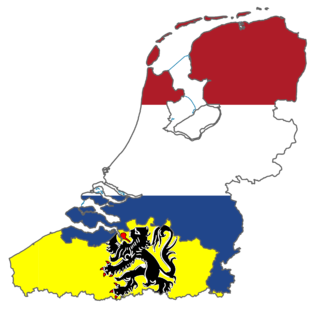
Greater Netherlands or Dietsland ("Dutchland") is a hypothetical monolingual polity formed by fusing the two Dutch-speaking regions of Flanders and the Netherlands. The concept was originally developed by Pieter Geyl, who argued that the two only separated during the Eighty Years' War against Spain in the 16th century.
Orangism, with supporters known as Orangists, may refer to one of several political movements:

Orang Asli are the indigenous people and the oldest inhabitants of Peninsular Malaysia. Officially, there are 18 Orang Asli tribes, categorised under three main groups according to their different languages and customs:
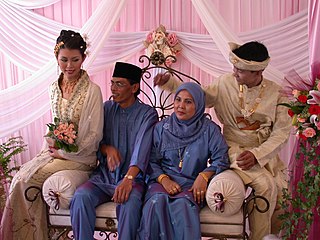
Malay Singaporeans or Singaporean Malays, are defined by the Government of Singapore and by intellectuals in the country using the broader concept of the Malay race, including ethnic Malays and related ethnic groups. Although the Malays are indigenous to the area that is now Singapore, and with established political rule recorded as early as the 13th century AD, most Malays in Singapore today include roots from both Malaysia and Indonesia. Prior to the arrival of Raffles, there were many of the indigenous Malays living on the island under the Johor Sultanate. Most of the indigenous Malays came from the Malay Archipelago. As of 2015, Malay Singaporeans constitute 15% of the country's citizens, making them the second largest ethnic group in Singapore.

The Orang Laut are several seafaring ethnic groups and tribes living around Singapore, peninsular Malaysia and the Riau Islands. The Orang Laut are commonly identified as the Orang Seletar from the Straits of Johor, but the term may also may refer to any Malay origin people living on coastal islands, including those of Andaman Sea islands of India and those in Thailand and Burma, commonly known as Moken.
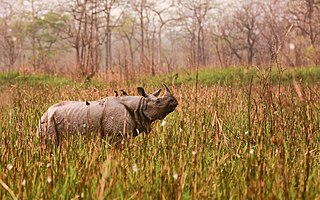
The Orang National Park also known as Rajiv Gandhi Orang National Park which is located on the north bank of the Brahmaputra River in the Darrang and Sonitpur districts of Assam, India, covers an area of 78.81 square kilometres (30.43 sq mi). It was established as a sanctuary in 1985 and declared a national park on 13 April 1999.The park has a rich flora and fauna, including great Indian one-horned rhinoceros, pygmy hog, elephants, wild buffalo and tigers. It is the only stronghold of rhinoceros on the north bank of the Brahmaputra river.

Orang Ulu is an ethnic designation politically coined to group together roughly 27 very small but ethnically diverse tribal groups in northeastern Sarawak, Malaysia with populations ranging from less than 300 persons to over 25,000 persons. Orang Ulu is not a legal term, and no such racial group exists or is listed in the Malaysian Constitution. The term was popularised by the Orang Ulu National Association (OUNA), which was formed in 1969.

The Mah Meri are an ethnic group native to western part of Peninsular Malaysia. They are one of the 18 Orang Asli groups named by the Malaysian government. They are of the Senoi subgroup. Most of the members of the Mah Meri tribe live along the coast of South Selangor from Sungai Pelek up to Pulau Carey, although there is at least one Mah Meri Community on the other side of the Klang River.
Orang Kanaq language is one of the Aboriginal Malay languages and it is grouped under the Austronesian language family. It is spoken by the Orang Kanaq, which is one of the 19 Orang Asli groups living in Peninsular Malaysia.
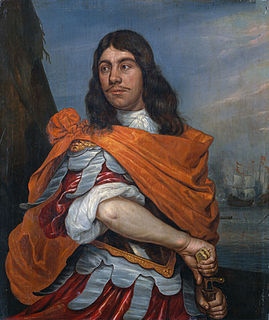
In the history of the Dutch Republic, Orangism or prinsgezindheid was a political force opposing the Staatsgezinde (pro-Republic) party. Orangists supported the princes of Orange as Stadtholders and military commanders of the Republic, as a check on the power of the regenten. The Orangist party drew its adherents largely from the common people, soldiers, the nobility and orthodox preachers, though its support fluctuated heavily over the course of the Republic's history.
Orangism was a political current in what is now Belgium that supported its inclusion in the short-lived United Kingdom of the Netherlands (1815–1830). After the secession of Belgium in 1830, Orangist sentiment in Flanders and Wallonia for a time sought a restoration of the United Kingdom of the Netherlands. It was a movement directed by William I of the Netherlands as part of his "Volhardingspolitiek" and containing most of the Belgian elites. Some of the most prominent Flemish Orangists were Jan Frans Willems and Hippolyte Metdepenningen. Although refusing to participate in parliamentary elections as they deemed Belgian national institutions as illegitimate, the Orangists did take part in local elections from which they activated against the new Belgian state through political actions and an activist press. At least three Orangist coups were foiled during the 1830s. Although losing Dutch financial and political support after the Treaty of London (1839) and William I's abdication (1840), the weakening Belgian Orangism survived well into the 1850s, strongly opposing the Belgian Revolution and rallying against independence.
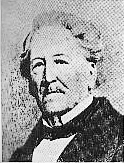
Orangism was a movement in the 19th century Grand Duchy of Luxembourg favouring the personal union of the Netherlands and Luxembourg under the House of Orange-Nassau. Made up of many notable figures, mainly nobles and Roman Catholic clergy, they were moderate liberals or conservative-liberals and slightly anti-clerical. At first they favoured maintaining the Grand Duchy's autonomous status and, especially during the Belgian Revolution, opposed it being merged into Belgium. In the end the western part of the Grand Duchy passed to Belgium, whilst the eastern part and the Orange grand duchy continued as an independent state. In 1890 the heads of the House of Orange were grand dukes of Luxembourg, but on the death of king and grand duke William III in 1890 he was succeeded by his relation Adolphe as grand duke since Luxembourg's constitution did not allow a woman to hold the throne. The movement's newsletter was the Journal de la Ville et du Pays Luxembourg.
The Department of Orang Asli Development, abbreviated JAKOA, is the Malaysian government agency entrusted to oversee the affairs of the Orang Asli. This body is under the Malaysian Ministry of Rural Development and was first set up in 1954.

Semelai people are an Orang Asli people of the Proto-Malay people group found in Negeri Sembilan and Pahang states of Malaysia.
Semaq Beri or Semoq Beri people are the native Orang Asli people belonging to the Senoi branch, who live in the states of Pahang and Terengganu in peninsular Malaysia. The Semaq Beri language is a language spoken by the people, is an Austroasiatic language that belongs to the Southern grouping of the branch of Aslian languages.












